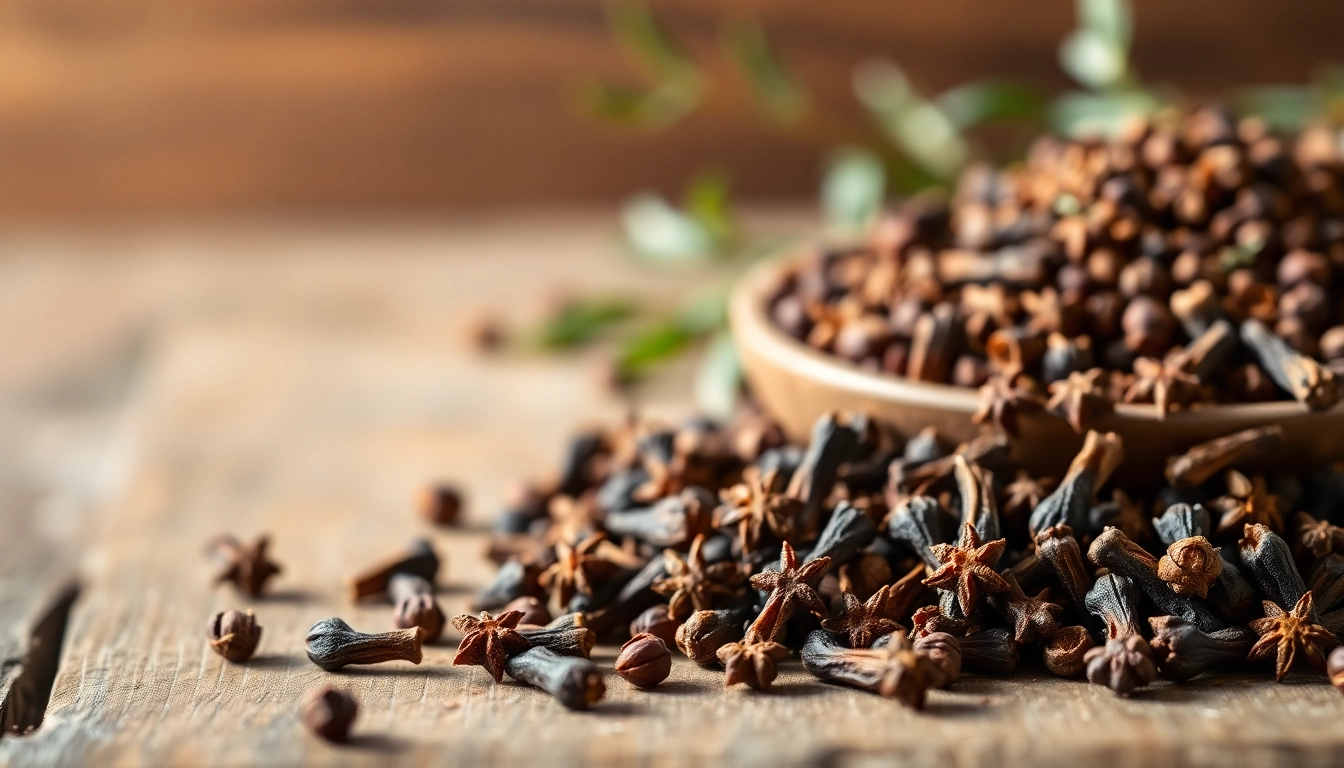Introduction to Cloves: Nature’s Aromatic Spice
Cloves, the aromatic flower buds of the Syzygium aromaticum tree, are a treasure trove of flavor, fragrance, and health benefits. Hailing from the Maluku Islands, commonly known as the Spice Islands, cloves are not only a staple in kitchens around the globe but also serve as an essential ingredient in cosmetics and health products. Their warm, sweet-spicy flavor enhances both savory dishes and sweet treats, making them a versatile addition to any kitchen. To delve deeper into the captivating world of cloves, you can explore Cloves in their whole form, which retain their aromatic qualities remarkably well.
What Are Cloves? A Botanical Overview
Cloves are the dried, unopened flower buds of the clove tree, which belongs to the Myrtaceae family. They are small, typically measuring about 1-2 centimeters in length, and are harvested before they bloom. The rich, dark brown color of cloves and their distinctive shape resemble tiny nails, hence their name. The primary component of their aroma and flavor is eugenol, which not only gives cloves their sweet heat but also contributes to their numerous health benefits.
Historical Significance of Cloves in Global Cuisines
Cloves have a storied history that dates back over 2,000 years. They were traded along ancient spice routes between Europe, Asia, and Africa. The demand for cloves was so high that they were once used as currency. In Medieval Europe, cloves were highly sought after for their flavor and their supposed medicinal properties. Today, they play a critical role in the cuisines of many cultures, from the rich curries of Indian cooking to the fragrant, spiced desserts in Middle Eastern cuisine.
Varieties of Cloves: Understanding Differences
While there is primarily one species of clove used for culinary purposes, Syzygium aromaticum, there are several cultivars and grades that vary in flavor, aroma, and potency. The two main types of cloves are:
- Zanzibar Cloves: Known for their sweet and aromatic flavor, these cloves are often considered premium due to their high oil content.
- Madagascar Cloves: These tend to have a slightly milder flavor and are often used in baking and spice blends.
Health Benefits of Cloves: More Than Just Flavor
Nutritional Profile of Cloves: Essential Compounds
Cloves are not just flavorful; they are also packed with nutrients. A small amount of cloves can provide significant health benefits due to their rich composition of vitamins and minerals. Key constituents include:
- Manganese: Essential for bone formation and metabolism.
- Vitamin C: An antioxidant that supports the immune system.
- Fiber: Aids in digestion and promotes gut health.
Additionally, cloves are rich in antioxidants, making them a powerful ally in combating oxidative stress in the body.
Medicinal Uses: Traditional and Modern Applications
Cloves have been utilized in traditional medicine for centuries due to their medicinal properties. In Ayurveda and Traditional Chinese Medicine, cloves are used to improve digestion, alleviate pain, and enhance oral health. Modern medicinal applications harness the power of clove oil, which is used in dental practices for its analgesic and antiseptic properties. It is often recommended for toothaches and is found in many dental products.
Antioxidant Properties and Their Implications for Health
The high antioxidant content in cloves is pivotal in reducing the risk of chronic diseases. Studies have shown that the phenolic compounds present in cloves can help reduce inflammation, manage blood sugar levels, and improve liver function. The antioxidant properties of cloves make them an excellent choice for supporting overall health and wellness.
Culinary Uses of Cloves: Adding Flavor to Dishes
Cooking with Cloves: Recipe Ideas and Tips
Cloves can be used in various culinary applications, enhancing both savory and sweet dishes. Here are a few creative ways to incorporate cloves into your cooking:
- Spiced Rice: Add a couple of whole cloves to your rice while cooking for an aromatic twist.
- Stews and Curries: Include ground cloves in your spice blend to deepen the flavor profile and add warmth.
- Clove-Infused Oils: Create a delightful oil by infusing cloves in olive oil for drizzling over salads or grilled vegetables.
Cloves in Baking: A Spice for Sweet Treats
In baking, cloves are commonly featured in holiday treats and seasonal desserts. Their warm flavor complements spices like cinnamon and nutmeg, making them a perfect addition to:
- Gingerbread: Use ground cloves in your gingerbread recipe for an enhanced spiciness.
- Pumpkin Pie: Cloves contribute to the classic pumpkin spice blend, adding depth and complexity.
- Fruitcakes: The addition of cloves enhances the flavors of dried fruits and nuts.
How to Store Cloves for Maximum Freshness
To ensure that your cloves retain their potency and flavor, follow these storage tips:
- Keep Them Whole: Whole cloves retain their flavor longer than ground cloves. Grind them only as needed.
- Use Airtight Containers: Store cloves in a cool, dark place in an airtight container to prevent exposure to moisture and light.
- Check for Freshness: If cloves lose their strong aroma, it’s time to replace them.
Cloves in Home Remedies: Natural Solutions
Clove Oil: Uses and Precautions
Clove oil is a concentrated form of the compound found in cloves and is used widely in home remedies. Its applications include:
- Pain Relief: Diluted clove oil can be applied topically to alleviate muscle and joint pain.
- Dental Care: A few drops can be applied to a cotton ball and held against a painful tooth for temporary relief.
- Insect Repellent: Clove oil can deter pests when used in various home formulations.
However, it’s crucial to use clove oil with caution. Due to its potency, it should always be diluted before topical application, and those with sensitive skin should perform a patch test first.
Clove Infusions: Preparing Herbal Teas
Infusing cloves in hot water creates a soothing herbal tea known for its health benefits. To prepare clove tea:
- Boil water and remove it from heat.
- Add 2-3 whole cloves or 1/2 teaspoon of ground cloves.
- Let steep for 5-10 minutes and strain before drinking.
This tea not only provides warmth and comfort but also aids in digestion and can help relieve cold symptoms.
Traditional Remedies: Cloves in Ayurvedic Practices
In Ayurvedic medicine, cloves are revered for their therapeutic properties. They are believed to balance the doshas and are often included in formulations designed to improve digestion, boost immunity, and purify the blood. Regular use of cloves in cooking or as supplements can aid in maintaining overall health in accordance with Ayurvedic principles.
Environmental Impact and Sustainability of Clove Farming
Ethical Sourcing: Why It Matters
The growing demand for cloves poses sustainability challenges that necessitate ethical sourcing practices. Supporting brands that emphasize sustainable farming practices ensures that the environment is protected and that farmers receive fair compensation. Clove cultivation can lead to deforestation and depletion of native species, necessitating conscious consumer choices.
The Future of Clove Production: Challenges and Opportunities
As global demand for cloves increases, the industry faces several challenges, including climate change, pest control, and market volatility. However, advancements in agricultural techniques and sustainable practices present opportunities for the future. Through innovation and care, the clove industry can flourish while minimizing its ecological footprint.
Supporting Sustainable Farming Practices
Consumers play a significant role in promoting sustainability by choosing products from companies that engage in ethical sourcing and sustainable agriculture. By supporting fair trade initiatives and organic farming, consumers not only contribute to environmental conservation but also ensure that their purchases have a positive impact on communities reliant on clove farming.



